The demand for butter flavor in Japan is valued at USD 16.1 million in 2025 and is projected to reach USD 29.4 million by 2035, reflecting a compound annual growth rate of 6.2%. Growth is shaped by expanding use of butter flavor compounds across bakery products, confectionery items and dairy-based preparations. Food manufacturers, bakery operations and confectionery producers continue to integrate these profiles into formulations that require rich mouthfeel and authentic dairy character. As recipe developers refine flavor balance techniques and incorporate more indulgent taste experiences, demand strengthens across a widening set of finished food categories. These adoption patterns support a stable and consistent rise throughout the forecast horizon.
The growth curve shows a clear upward trajectory, beginning at USD 12.6 billion in earlier years and increasing to USD 16.1 million in 2025 before progressing toward USD 29.4 million by 2035. Yearly values advance in steady increments, with demand rising from USD 17.1 million in 2026 to USD 18.2 million in 2027 and continuing through USD 23.8 million in 2032 and USD 27.7 million in 2034. This pattern reflects predictable expansion driven by regular ingredient sourcing, broader application in bakery and confectionery settings and the growing use of butter flavor profiles across product enhancement and taste optimization. The curve highlights consistent growth supported by the combination of routine production need and extended adoption across Japan's bakery, confectionery and dairy processing landscape.
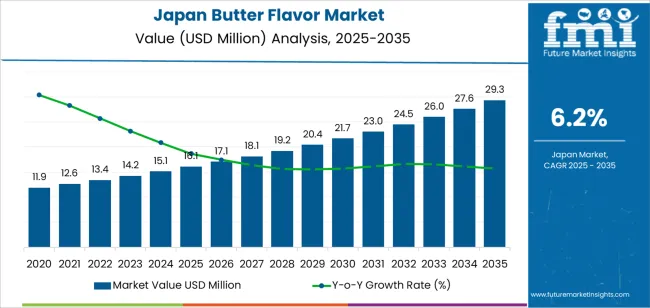
Demand in Japan for butter flavor is projected to increase from USD 16.1 million in 2025 to USD 29.4 million by 2035, reflecting a compound annual growth rate (CAGR) of approximately 6.2%. Starting at USD 12.6 million in 2020, the value rises steadily: USD 14.6 million in 2022, USD 15.5 million in 2024, and USD 16.1 million in 2025. From 2025 to 2030, demand climbs to around USD 21.5 million, and by 2035 it reaches USD 29.4 million. Growth is driven by expanding applications of butter flavor in bakery goods, confectionery production, dairy preparations and premium convenience foods in Japan's ingredient supply environment.
Over the forecast period, the value uplift from USD 16.1 million to USD 29.4 million translates into an incremental opportunity of USD 13.3 million. Early growth (2025 2030) is primarily volume driven as more bakery chains and confectionery manufacturers adopt butter flavor systems. In the latter years (2030 2035), value growth becomes increasingly significant: premium butter flavor variants with enhanced creaminess, natural sourcing credentials, cultured butter profiles and artisan character elevate average selling prices. Suppliers who innovate in flavor authenticity, application stability and natural ingredient positioning are best positioned to capture the full breadth of this demand growth in Japan.
| Metric | Value |
|---|---|
| Industry Value (2025) | USD 16.1 million |
| Forecast Value (2035) | USD 29.4 million |
| Forecast CAGR (2025–2035) | 6.2% |
The demand for butter flavor in Japan has historically been shaped by the strength of domestic bakery operations, where rich dairy notes dominated premium bread, pastry and cake formulations. Japanese bakery chains focused on delivering soft crumb texture, authentic butter aroma and consumer-preferred indulgence levels, which supported steady procurement of liquid and powder butter flavor compounds. Premium confectionery expansion accelerated demand as Japan's gift culture required high-quality cookies, chocolate fillings and seasonal sweet offerings with recognizable butter character. Historical growth was reinforced by consistent product premiumization, since Japanese bakery brands developed signature butter-forward items that commanded higher price points and strong consumer loyalty. These conditions created predictable, long-term demand for butter flavor tied closely to the output volume of premium baked goods and confectionery across manufacturing facilities within the country.
Future growth will be influenced by Japan's shift toward artisan bakery experiences, natural ingredient transparency and the need for authentic dairy flavor systems in reduced-fat and plant-butter hybrid formulations. Premium croissant production, which requires layered butter notes that survive high-temperature baking, creates opportunities for heat-stable flavor compounds that maintain character through thermal processing. This creates a continuing but more technically demanding requirement. Long-term challenges arise from the expansion of plant-based bakery segments that require butter flavor without dairy origins. As Japan moves toward more inclusive dietary options, butter flavor demand will rely increasingly on fermentation-derived compounds, natural flavor extracts and hybrid dairy-plant systems rather than broad, conventional butter flavor formulations.
The demand for butter flavor in Japan is shaped by the product forms used to deliver creamy profiles and the nature classifications that determine ingredient positioning. Product categories include powder form and liquid form, each offering different stability characteristics and processing compatibility. Nature classifications such as natural and artificial support varied labeling strategies and consumer preference alignment. As bakery operators and confectionery developers focus on consistent flavor performance and practical formulation integration, the combination of physical state and nature designation influences purchasing decisions across Japan's bakery ingredient, confectionery supply and dairy processing settings.
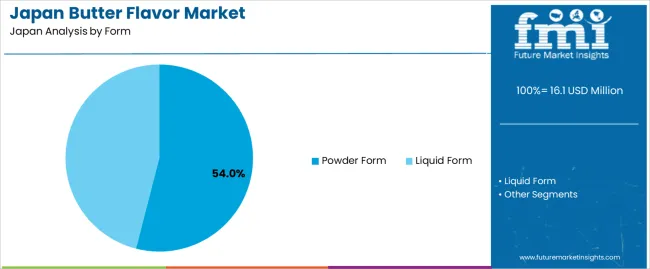
Powder form accounts for 54% of total demand across product form categories in Japan. Its leading share reflects straightforward dry blending capability, predictable moisture management and suitability for dry mix applications. Many bakery ingredient suppliers value powder systems for consistent dispersion behavior that supports uniform flavor distribution across cake mixes, cookie doughs and pastry fillings. These systems offer manageable inventory handling and easy integration into existing formulation databases. Their dry format suits environments that prioritize extended ambient storage without flavor degradation, reinforcing steady use across large-scale bakery production operations.
Demand for powder butter flavor also grows as companies adopt microencapsulation methods that protect volatile dairy notes. Facilities appreciate the reduced oxidation risk and predictable reconstitution performance associated with these materials. Their free-flowing characteristics support automated dosing systems, making them practical for high-throughput bakery lines. The technology provides sufficient flavor intensity for standard inclusion rates, meeting expectations for rich butter presence. As bakery chains continue seeking efficient ingredient handling solutions, powder form butter flavor maintains a strong presence in Japan.
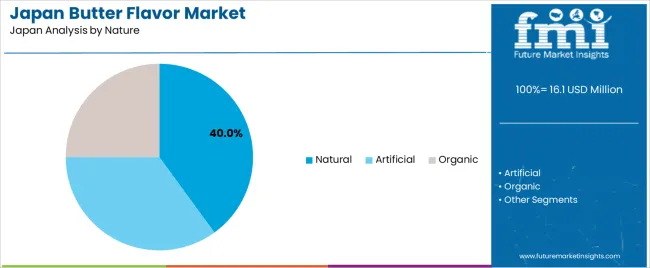
Natural nature classification accounts for 40.0% of total demand across nature categories in Japan. Its leading position reflects clear advantages in clean-label positioning, consumer trust and regulatory compliance simplicity. Natural butter flavor systems support ingredient declarations that align with Japan's growing preference for recognizable food components, enabling bakery brands to communicate authentic dairy sourcing without synthetic qualifiers. Their botanical or fermentation origins allow straightforward label claims that resonate with health-conscious consumers and premium product positioning. Bakery operations rely on these systems for applications that require transparent ingredient storytelling and consumer-preferred authenticity signals.
Demand for natural butter flavor grows as premium bakery segments emphasize minimal processing and ingredient integrity. The nature classification supports marketing narratives that emphasize traditional craftsmanship and quality raw materials. Product developers value the material's compatibility with organic certification pathways and clean-label initiatives. Sensory evaluation panels appreciate the nuanced flavor profiles that emerge from cream distillates and cultured butter extracts. As Japan continues to emphasize food transparency, natural butter flavor remains central to premium bakery ingredient adoption.
Demand for butter flavor in Japan is influenced by robust bakery consumption, strong confectionery gifting traditions and a consumer base that values authentic dairy richness in premium food experiences. Japan's bakery ecosystem favors ingredients that offer consistent performance across varied baking conditions, extended shelf stability in finished goods and compatibility with delicate crumb structures, which positions butter flavor systems well for bread enrichment, pastry layering and cake moistening applications. At the same time, ingredient selection remains quality-focused, and flavor compounds must meet strict domestic standards for dairy authenticity, thermal stability and compatibility with Japanese wheat flour characteristics across production operations.
How Are Japan's Bakery Traditions and Consumer Expectations Encouraging New Applications?
Butter flavor gains traction because Japan's bakery culture emphasizes soft, milk-enriched bread varieties that require pronounced dairy character without excessive fat content. Bakery chains and pastry shops rely heavily on signature butter-forward products for brand differentiation, and butter flavor compounds align with this long-standing competitive requirement. Japanese bakers also favor ingredients that perform reliably within tight production schedules, making butter flavor systems useful in croissant lamination, cake batter enrichment and cookie dough formulation. These patterns reflect Japan's emphasis on consistent quality and recognizable dairy presence across bakery retail channels.
Where Are Practical Growth Opportunities for Butter Flavor in Japan?
Opportunities exist in premium croissant production, artisan cookie manufacturing, seasonal confectionery offerings and hybrid plant-dairy bakery innovations combining traditional butter notes with plant-based fat systems. Japan's established bakery ingredient network creates openings for specialized butter flavor compounds that integrate with Japanese flour milling standards, local sweetener preferences and regional baking techniques. As convenience store bakery sections expand fresh-baked offerings, demand increases for heat-stable butter flavor concentrates with rapid aroma release during warming. Ingredient suppliers offering Japan-specific flavor profiles, technical baking support and stability testing documentation may find strong adoption.
What Local Factors Are Constraining Wider Adoption of Butter Flavor in Japan?
Constraints stem from premium bakery segment preference for actual butter over flavor compounds, cost sensitivity among mid-tier bakery operations and strong consumer ability to detect inferior dairy character. Some traditional bakery operations rely on established butter procurement relationships rather than flavor alternatives, limiting compound adoption. Integration challenges with delicate Japanese cake formulations and the need for alignment with specific moisture and crumb structure targets further delay uptake. In addition, smaller regional bakeries may hesitate due to limited technical knowledge for flavor system optimization in traditional recipes, creating uneven adoption across Japan.
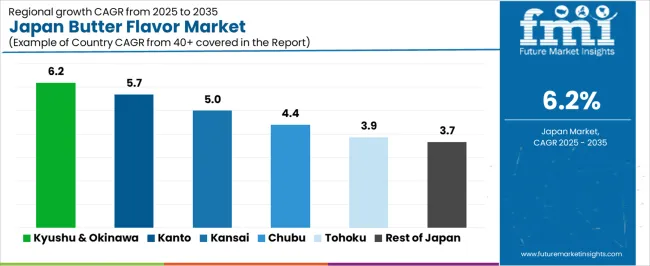
| Region | CAGR (%) |
|---|---|
| Kyushu & Okinawa | 6.2% |
| Kanto | 5.7% |
| Kinki | 5.0% |
| Chubu | 4.4% |
| Tohoku | 3.9% |
| Rest of Japan | 3.7% |
Demand for butter flavor in Japan is rising across regions, with Kyushu and Okinawa leading at 6.2%. Growth in this region reflects expanding use of rich dairy profiles in bakery chains, confectionery shops and convenience store bakery sections. Kanto follows at 5.7%, supported by dense bakery networks and steady innovation in premium bread and pastry categories. Kinki records 5.0%, shaped by active confectionery operations and artisan bakery shops applying butter flavor in traditional and contemporary formulations. Chubu grows at 4.4%, influenced by regional bakery chains and ingredient distributors integrating flavor compounds into local production lines. Tohoku reaches 3.9%, showing gradual but consistent adoption. The rest of Japan posts 3.7%, reflecting broader interest in butter flavor technologies across smaller bakery operations.
Kyushu & Okinawa is projected to grow at a CAGR of 6.2% through 2035 in demand for butter flavor. Fukuoka bakery chains and surrounding confectionery manufacturers are increasingly adopting flavor compounds for bread enrichment, pastry production and cookie formulation. Rising demand for premium bakery experiences, regional specialty sweets and convenience bakery expansion drives adoption. Ingredient suppliers provide heat-stable, high-intensity and natural-leaning butter flavor solutions suitable for bakery operations and confectionery producers. Distributors ensure accessibility across urban, semi-urban and production facilities. Growth in premium bread production, confectionery manufacturing and convenience bakery offerings supports steady adoption of butter flavor in Kyushu & Okinawa.
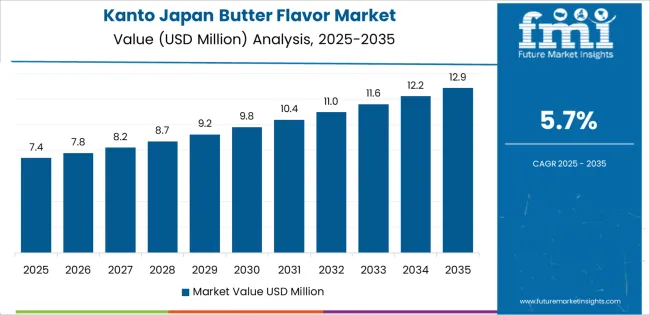
Kanto is projected to grow at a CAGR of 5.7% through 2035 in demand for butter flavor. Tokyo and surrounding regions are increasingly using flavor compounds for premium bakery goods, confectionery items and convenience store bakery sections. Rising focus on artisan bread experiences, seasonal confectionery offerings and rapid product turnover cycles drives adoption. Ingredient suppliers provide authentic, application-tested and stability-proven butter flavor solutions suitable for large bakery chains and specialty confectionery brands. Distributors ensure accessibility across urban, semi-urban and bakery networks. Expansion in artisan bread production, seasonal confectionery manufacturing and convenience bakery growth supports steady adoption of butter flavor across Kanto.
Kinki is projected to grow at a CAGR of 5.0% through 2035 in demand for butter flavor. Osaka, Kyoto and surrounding regions are increasingly adopting flavor compounds for traditional confectionery, modern bakery items and specialty pastry production. Rising demand for authentic dairy character, premium positioning and regional taste preferences drives adoption. Ingredient suppliers provide traditional-profile, versatile and production-compatible butter flavor solutions suitable for confectionery manufacturers, bakery operations and pastry shops. Distributors ensure accessibility across urban and semi-urban production centers. Growth in traditional confectionery production, modern bakery expansion and specialty pastry manufacturing supports steady adoption of butter flavor across Kinki.
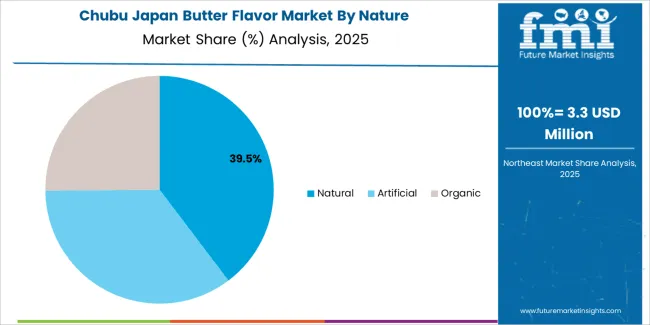
Chubu is projected to grow at a CAGR of 4.4% through 2035 in demand for butter flavor. Nagoya and surrounding areas are increasingly adopting flavor compounds for bakery production, confectionery manufacturing and convenience food applications in processing facilities. Rising focus on consistent flavor delivery, cost efficiency and formulation compatibility drives adoption. Ingredient suppliers provide reliable, economical and application-ready butter flavor solutions suitable for regional bakery chains and confectionery producers. Distributors ensure availability across urban and semi-urban production facilities. Expansion in bakery bread production, confectionery manufacturing and convenience food preparation supports steady adoption of butter flavor across Chubu.
Tohoku is projected to grow at a CAGR of 3.9% through 2035 in demand for butter flavor. Sendai and surrounding bakery operations are gradually adopting flavor compounds for bread enrichment, regional confectionery items and specialty bakery products. Rising focus on product differentiation, dairy richness enhancement and regional specialty development drives adoption. Ingredient suppliers provide dependable, regionally-suitable and processing-stable butter flavor solutions suitable for local bakery chains and specialty confectionery makers. Distributors ensure accessibility across urban, semi-urban and regional production facilities. Expansion in regional bread production, specialty confectionery manufacturing and local bakery innovation supports steady adoption of butter flavor across Tohoku.
The Rest of Japan is projected to grow at a CAGR of 3.7% through 2035 in demand for butter flavor. Smaller towns and rural bakery operations gradually adopt flavor compounds for local bread production, traditional confectionery manufacturing and specialty bakery development. Rising demand for dairy richness enhancement, product variety and regional bakery offerings drives adoption. Ingredient suppliers provide accessible, straightforward and formulation-friendly butter flavor solutions suitable for small-scale bakeries, regional confectionery makers and specialty pastry shops. Distributors ensure accessibility across urban, semi-urban and rural production centers. Expansion in local bread manufacturing, traditional confectionery production and regional specialty bakery supports steady adoption of butter flavor across the Rest of Japan.
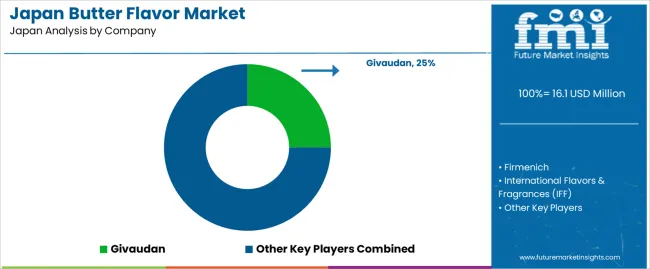
The demand for butter flavor in Japan is driven by the country's vibrant bakery culture, strong confectionery gifting traditions and growing interest in premium dairy experiences across retail food channels. Bakery operators seek authentic flavor compounds to create signature products, deliver consistent dairy richness and meet consumer expectations for indulgent taste profiles. Concurrently, clean-label and natural ingredient movements expand, pushing interest in butter flavor systems capable of providing natural declarations, cultured butter complexity and transparent sourcing narratives. Technological improvements such as spray-drying refinements, fermentation-derived precursors and microencapsulation advances further enhance suitability of butter flavor in Japanese bakery plants, confectionery facilities and convenience food production operations.
Key companies active in Japan's butter flavor space include Swiss flavor house Givaudan, Swiss-based Firmenich and global suppliers such as International Flavors & Fragrances (IFF) and Symrise AG. Givaudan operates regional application centers serving Asian bakery clients with customized butter flavor development, while Firmenich maintains sensory laboratories in Japan for local product refinement support. IFF and Symrise supply natural and synthetic butter flavor compounds through established ingredient distribution partnerships. This mix of multinational flavor specialists and regional technical teams reflects the competitive landscape in Japan, ensuring that butter flavor adoption is shaped by global dairy flavor expertise and local bakery application knowledge.
| Items | Values |
|---|---|
| Quantitative Units (2025) | USD million |
| Product Form | Powder Form, Liquid Form |
| Nature | Natural, Artificial |
| Application | Dairy-based, Confectioners, Bakery Goods, Baked Goods, Dairy Products, Dry Mixes, Confectionery, Dry Mixes |
| Region | Kyushu & Okinawa, Kanto, Kinki, Chubu, Tohoku, Rest of Japan |
| Countries Covered | Japan |
| Key Companies Profiled | Givaudan, Firmenich, International Flavors & Fragrances (IFF), Symrise AG, Sensient Technologies |
| Additional Attributes | Dollar sales by product form and nature, regional CAGR trends, and value–volume contributions are assessed alongside bakery vs. confectionery adoption, powder vs. liquid penetration, natural vs. artificial preferences, clean-label alignment, flavor authenticity and heat stability, premium-segment opportunities, category constraints, and competition between global flavor houses and Japanese ingredient specialists. |
The demand for butter flavor in Japan is estimated to be valued at USD 16.1 million in 2025.
The market size for the butter flavor in Japan is projected to reach USD 29.3 million by 2035.
The demand for butter flavor in Japan is expected to grow at a 6.2% CAGR between 2025 and 2035.
The key product types in butter flavor in Japan are powder form and liquid form.
In terms of nature, natural segment is expected to command 40.0% share in the butter flavor in Japan in 2025.






Our Research Products

The "Full Research Suite" delivers actionable market intel, deep dives on markets or technologies, so clients act faster, cut risk, and unlock growth.

The Leaderboard benchmarks and ranks top vendors, classifying them as Established Leaders, Leading Challengers, or Disruptors & Challengers.

Locates where complements amplify value and substitutes erode it, forecasting net impact by horizon

We deliver granular, decision-grade intel: market sizing, 5-year forecasts, pricing, adoption, usage, revenue, and operational KPIs—plus competitor tracking, regulation, and value chains—across 60 countries broadly.

Spot the shifts before they hit your P&L. We track inflection points, adoption curves, pricing moves, and ecosystem plays to show where demand is heading, why it is changing, and what to do next across high-growth markets and disruptive tech

Real-time reads of user behavior. We track shifting priorities, perceptions of today’s and next-gen services, and provider experience, then pace how fast tech moves from trial to adoption, blending buyer, consumer, and channel inputs with social signals (#WhySwitch, #UX).

Partner with our analyst team to build a custom report designed around your business priorities. From analysing market trends to assessing competitors or crafting bespoke datasets, we tailor insights to your needs.
Supplier Intelligence
Discovery & Profiling
Capacity & Footprint
Performance & Risk
Compliance & Governance
Commercial Readiness
Who Supplies Whom
Scorecards & Shortlists
Playbooks & Docs
Category Intelligence
Definition & Scope
Demand & Use Cases
Cost Drivers
Market Structure
Supply Chain Map
Trade & Policy
Operating Norms
Deliverables
Buyer Intelligence
Account Basics
Spend & Scope
Procurement Model
Vendor Requirements
Terms & Policies
Entry Strategy
Pain Points & Triggers
Outputs
Pricing Analysis
Benchmarks
Trends
Should-Cost
Indexation
Landed Cost
Commercial Terms
Deliverables
Brand Analysis
Positioning & Value Prop
Share & Presence
Customer Evidence
Go-to-Market
Digital & Reputation
Compliance & Trust
KPIs & Gaps
Outputs
Full Research Suite comprises of:
Market outlook & trends analysis
Interviews & case studies
Strategic recommendations
Vendor profiles & capabilities analysis
5-year forecasts
8 regions and 60+ country-level data splits
Market segment data splits
12 months of continuous data updates
DELIVERED AS:
PDF EXCEL ONLINE
Butter Flavor Market Trends – Food & Beverage Innovation 2025 to 2035
Flavored Butter And Oils Market Size and Share Forecast Outlook 2025 to 2035
Demand for Cheese Flavor in Japan Size and Share Forecast Outlook 2025 to 2035
Demand for Brandy Flavor in Japan Size and Share Forecast Outlook 2025 to 2035
Japan Faith-based Tourism Market Size and Share Forecast Outlook 2025 to 2035
Japan Sports Tourism Market Size and Share Forecast Outlook 2025 to 2035
Flavor Modulator Market Size and Share Forecast Outlook 2025 to 2035
Japan Respiratory Inhaler Devices Market Size and Share Forecast Outlook 2025 to 2035
Japan Halal Tourism Market Size and Share Forecast Outlook 2025 to 2035
Flavor Emulsions Market Size and Share Forecast Outlook 2025 to 2035
Flavor Masking Agents Market Size and Share Forecast Outlook 2025 to 2035
Flavor Modulators Market Size and Share Forecast Outlook 2025 to 2035
Flavor Compounds Market Size and Share Forecast Outlook 2025 to 2035
Japan Automated People Mover Industry Size and Share Forecast Outlook 2025 to 2035
Flavoring Cosmetic Formulation Agents Market Size and Share Forecast Outlook 2025 to 2035
Japan Automotive Load Floor Industry Analysis Size and Share Forecast Outlook 2025 to 2035
Flavored Whiskey Market Size and Share Forecast Outlook 2025 to 2035
Japan Food Cling Film Market Size and Share Forecast Outlook 2025 to 2035
Japan Polypropylene Packaging Films Market Size and Share Forecast Outlook 2025 to 2035
Flavoring Oils Market Size and Share Forecast Outlook 2025 to 2035

Thank you!
You will receive an email from our Business Development Manager. Please be sure to check your SPAM/JUNK folder too.
Chat With
MaRIA